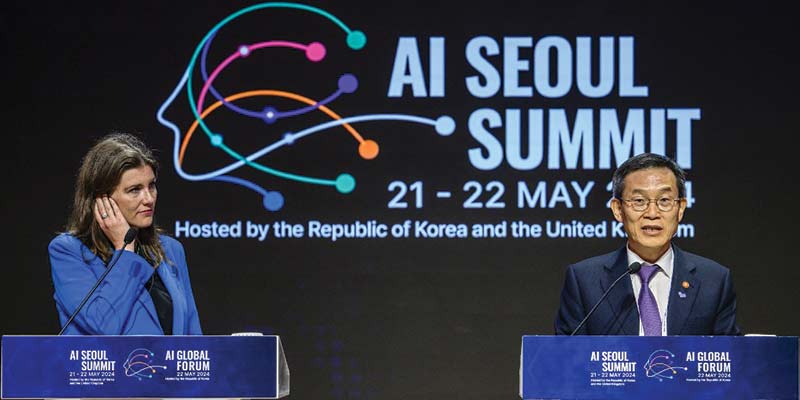- World
- May 23
Explainer - AI Seoul Summit
• A new agreement between 10 countries plus the European Union, reached at the AI Seoul Summit, has committed nations to work together to launch an international network to accelerate the advancement of the science of AI safety.
• The UK government co-hosted the AI Seoul Summit with South Korea on May 21 and 22.
• It builds on the legacy of the first AI Safety Summit which was hosted by the UK at Bletchley Park in November 2023, bringing together international governments, AI companies, academia, and civil society to advance global discussions on AI.
The summit’s primary goal was for countries and industry leaders to converge on the following three critical priorities:
i) Safety: To reaffirm the commitment to AI safety and to further develop a roadmap for ensuring AI safety.
ii) Innovation: To emphasise the importance of promoting innovation within AI development.
iii) Inclusivity: To champion the equitable sharing of AI’s opportunities and benefits.
• Many countries including the United States and France agreed to work together against threats from cutting-edge AI, including severe risks.
• As part of the talks, leaders signed up to the wider Seoul Declaration which cements the importance of enhanced international cooperation to develop AI that is “human-centric, trustworthy and responsible”, so that it can be used to solve the world’s biggest challenges, protect human rights, and bridge global digital divides.
• They recognised the importance of a risk-based approach in governing AI to maximise the benefits and address the broad range of risks from AI, to ensure the safe, secure, and trustworthy design, development, deployment, and use of Al.
• New commitments to develop AI safely have been agreed with 16 AI tech companies spanning the globe.
• AI tech companies will each publish safety frameworks on how they will measure risks of their frontier AI models, such as examining the risk of misuse of technology by bad actors.
• The 16 companies who have agreed to these commitments represent the most significant AI technology companies around the world, including representation from the US and China, the world’s two biggest AI powers.
What is artificial intelligence?
• The term ‘artificial intelligence’ (AI) means a machine-based system that can, for a given set of human-defined objectives, make predictions, recommendations or decisions influencing real or virtual environments.
• AI is the use of digital technology to create systems capable of performing tasks commonly thought to require human intelligence.
• AI is expected to change the way we work and live. In view of its positive impact on the economy, the technology is being embraced by countries across the world. Its proliferation is being regarded as the fourth industrial revolution.
• AI presents enormous global opportunities: it has the potential to transform and enhance human well-being, peace and prosperity.
• AI promises to transform nearly every aspect of our economy and society. The opportunities are transformational — advancing drug discovery, making transport safer and cleaner, improving public services, speeding up and improving diagnosis and treatment of diseases like cancer and much more.
• However, AI should be designed, developed, deployed, and used, in a manner that is safe, in such a way as to be human-centric, trustworthy and responsible.
• The opportunities are vast, and there is great potential for increasing the productivity of workers of all kinds.
• However, these huge opportunities come with risks that could threaten global stability and undermine our values.
• AI poses risks in ways that do not respect national boundaries. It is important that governments, academia, businesses, and civil society work together to navigate these risks, which are complex and hard to predict, to mitigate the potential dangers and ensure AI benefits society.
Manorama Yearbook app is now available on Google Play Store and iOS App Store

